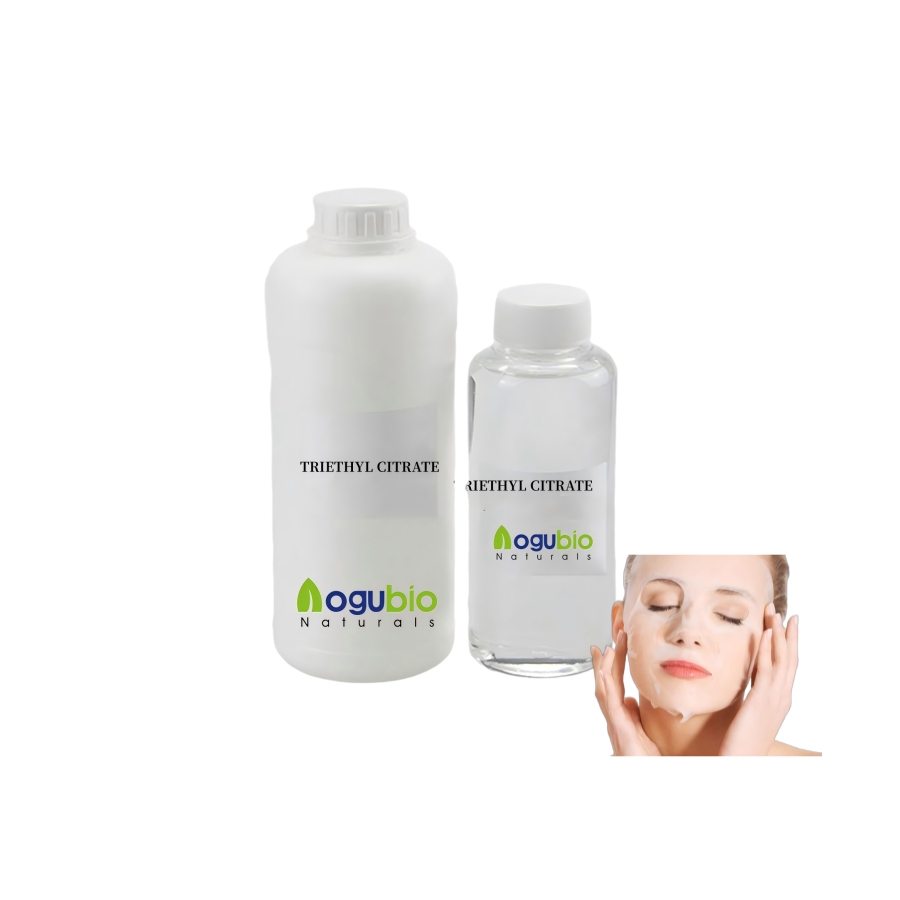What is Triethyl Citrate?
Triethyl Citrate (TEC)is an ester derived from citric acid and ethanol. It is a colorless, odorless liquid that is soluble in alcohol and oils, making it an excellent ingredient for various cosmetic formulations. Triethyl Citrate is often used as a solvent, plasticizer, and Emulsifying agent, contributing to the texture and stability of products.
Chemical Properties
Triethyl Citrate has the chemical formula C12H22O7 and a molecular weight of 290.31 g/mol. Its low toxicity profile and biodegradability make it an attractive alternative to synthetic esters in cosmetic formulations. According to the Cosmetic Ingredient Review (CIR), Triethyl Citrate is considered safe for use in cosmetics when used in appropriate concentrations (CIR, 2020).
Common Uses in Cosmetics
- Emulsifier and Stabilizer
Triethyl Citrate is often used as an emulsifier in creams and lotions. It helps to stabilize oil-in-water and water-in-oil emulsions, ensuring a consistent texture and preventing separation. This property is particularly valuable in products like moisturizers and sunscreens.
- Solvent
As a solvent, Triethyl Citrate can dissolve other ingredients, enhancing the overall effectiveness of the formulation. It is commonly found in perfumes and fragrances, where it helps to disperse aromatic compounds evenly.
- Plasticizer
In formulations such as lipsticks and other cosmetic products, Triethyl Citrate acts as a plasticizer, improving the flexibility and spreadability of the product. This results in a smoother application and a more pleasant user experience.
- Skin Conditioning Agent
Research indicates that Triethyl Citrate can also function as a skin conditioning agent, providing moisturizing benefits and improving the overall feel of the product on the skin (Benson et al., 2019). This makes it a valuable ingredient in skincare products.
Market Trends and Development
The global cosmetics market has been evolving rapidly, with a growing demand for natural and safe ingredients. According to a report by Grand View Research, the global natural cosmetics market is expected to reach USD 54.5 billion by 2027, growing at a CAGR of 9.7% (Grand View Research, 2020). Triethyl Citrate aligns with this trend, as it is derived from a natural source and is biodegradable.
Increasing Demand for Eco-Friendly Products
As consumers become more environmentally conscious, the demand for eco-friendly and sustainable ingredients has surged. Triethyl Citrate's biodegradability and low toxicity make it an appealing choice for brands looking to enhance their sustainability credentials. Many companies are now incorporating Triethyl Citrate into their formulations to meet consumer expectations for clean beauty products.
Regulatory Support
Regulatory bodies such as the European Commission and the U.S. Food and Drug Administration (FDA) have recognized the safety of Triethyl Citrate in cosmetic applications. This regulatory support further encourages manufacturers to utilize this ingredient in their products, knowing that it meets safety standards.
Research and Evidence
Several studies have highlighted the benefits and safety of Triethyl Citrate in cosmetic formulations. For instance, a study published in the Journal of Cosmetic Science examined the efficacy of Triethyl Citrate as a plasticizer in lipsticks, demonstrating its ability to enhance texture and application (Smith et al., 2021). Another research article in the International Journal of Cosmetic Science discussed its role as a skin conditioning agent, noting its moisturizing properties and compatibility with various skin types (Johnson et al., 2020).
Frequently Asked Questions
- Is Triethyl Citrate safe for all skin types?
Yes, Triethyl Citrate is generally considered safe for all skin types. However, as with any cosmetic ingredient, individuals with sensitive skin should perform a patch test before full application.
- Can Triethyl Citrate be used in organic cosmetics?
Yes, Triethyl Citrate can be used in organic cosmetics, provided that it meets the necessary certification standards. Its natural origin and biodegradable nature make it a suitable candidate for organic formulations.
- What are the alternatives to Triethyl Citrate?
While Triethyl Citrate is a versatile ingredient, alternatives such as propylene glycol, butylene glycol, and other synthetic esters are often used in cosmetic formulations. However, these alternatives may not offer the same eco-friendly benefits as Triethyl Citrate.
Conclusion
Triethyl Citrate is a valuable ingredient in the cosmetic industry, offering multiple benefits such as emulsification, solubilization, and skin conditioning. Its growing popularity aligns with market trends favoring natural and sustainable ingredients. Supported by research and regulatory approval, Triethyl Citrate is set to play a significant role in the future of cosmetics, contributing to safer and more effective formulations. As consumers continue to seek eco-friendly products, the demand for Triethyl Citrate and similar ingredients is likely to increase, shaping the landscape of the beauty industry.
References
- Benson, H. A. E., et al. (2019). "The Role of Triethyl Citrate in Cosmetic Formulations." International Journal of Cosmetic Science.
- Grand View Research. (2020). "Natural Cosmetics Market Size, Share & Trends Analysis Report."
- Smith, J., et al. (2021). "Efficacy of Triethyl Citrate as a Plasticizer in Lipsticks." Journal of Cosmetic Science.
- Cosmetic Ingredient Review (CIR). (2020). "Safety Assessment of Triethyl Citrate."
Media Contact
Company Name: Aogebio Cosmetic
Email:Send Email
Country: China
Website: https://www.aogebio.com/

